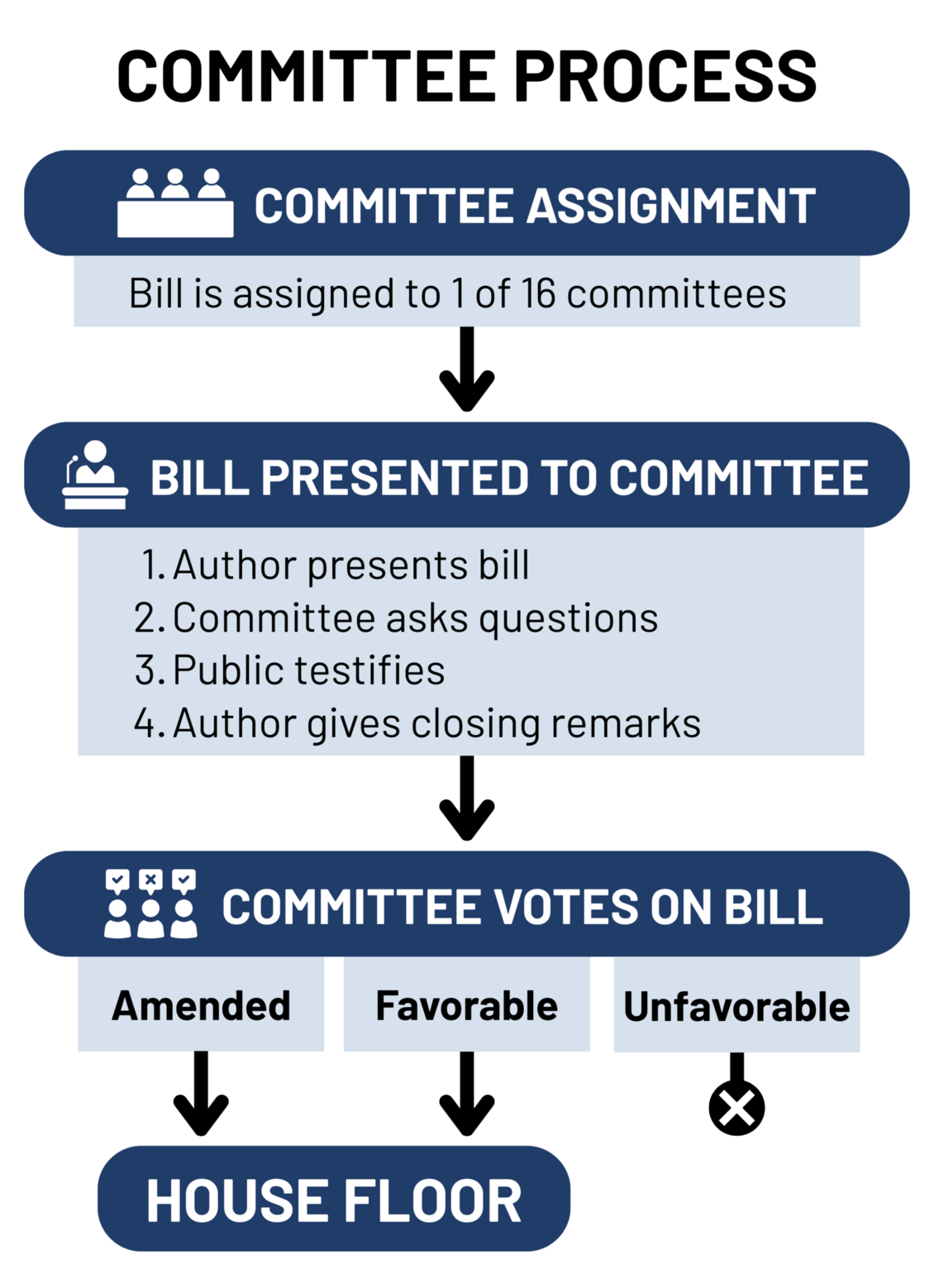Complete Story
05/14/2025
How Committee Hearings Work in the Louisiana House of Representatives
By: Patrick Riley
Director of Government Affairs & Assistant General Counsel
A couple of weeks ago, we explored how a bill becomes a law. This week, let’s dive into one of the most important, but often overlooked, stages of that process: the committee hearing. For many bills, the real action doesn’t happen on the House or Senate floor. It happens in the committee room, where legislation is debated, amended, and often quietly laid to rest.
For the purposes of this article, we’ll focus on House committee procedures in Louisiana. The Senate process is nearly identical, though some of the finer rules vary slightly. What follows is a look at a typical committee meeting. There are other procedural motions that can interrupt or alter the flow of business, and we may explore those in a future post. But for now, let’s walk through how bills move through committees in Louisiana’s legislative process, from scheduling to public testimony to committee votes.
What Happens in a Louisiana Committee Hearing?
Once a bill is filed, it’s referred to a committee based on its subject matter. With a few exceptions, tax bills go to Ways and Means, legal reform bills go to Civil Law & Procedure, oil and gas bills go to Natural Resources & Environment, and so on. In the House, this determination is made by the Speaker, working in tandem with the relevant committee chairmen. Once assigned, it’s up to the chair to decide which bills will be heard and when. When a meeting is scheduled, the committee announces its meeting and publishes its agenda, both on the legislative website, and physically outside of the committee room.
On the appointed day and time, the committee chairman will call the meeting to order and begin the process of hearing items on the agenda. When a bill is called, the author is invited to the table to make their initial presentation on the bill, typically summarizing its purpose and relevance. Committee members may ask questions at any point. Once the author has finished presenting, members of the public are invited to testify. Those in support of the bill are invited to speak first, followed by those in opposition.
After all testimony has been heard, the chair will read the cards submitted in support or opposition for the official record. (Note: if you attend a committee meeting, you can submit a green card to show support or a red card to indicate opposition. You can also note whether you wish to testify or simply have your position recorded.) At that point, the author is given the opportunity to make a closing argument on their bill.
How Committees Decide What Happens to a Bill
After closing remarks from the bill’s author, the committee must decide how to dispose of the bill. Under House Rule 6.11, there are five possible designations for committee reports: (1) reported favorably, (2) reported unfavorably, (3) reported with amendments, (4) reported by substitute, and (5) reported with a recommendation that the bill be recommitted to another committee. We will not discuss substitute bills or recommittal to a second committee in this article, so let’s discuss the three primary outcomes in more detail.
Primary Types of Bill Designations in the Louisiana House Committees
- Reported Favorably – This is the simplest outcome for a bill in committee, and the one that is most desirable to the bill’s author. In this case, the committee determines that the bill is ready to move forward to the House floor for debate. Any member of the committee may make the motion to report favorably, and that motion requires a majority vote (or no objection) to succeed.
- Reported with Amendments – This outcome is nearly identical to reporting a bill favorably, with one key difference. During the committee meeting, members may offer amendments to the bill. If any amendments are adopted, and the committee votes to move the bill forward to the House floor, the bill is reported with amendments.
- Reported Unfavorably – This outcome is actually rarely seen, for the reasons discussed in the next paragraph, but it is essentially the opposite of a favorable report. If a motion to report unfavorably passes by a majority vote, the bill will advance to the House floor with the intent of being withdrawn from the files of the House.
Alternative Mechanisms: Voluntary vs. Involuntary Deferrals
There are three other ways that a bill may not advance to the House floor that are worth discussing, as they are far more common than an unfavorable report. Under House Rule 6.10, a bill may be deferred from consideration, either voluntarily or involuntarily.
Types of Deferrals in Louisiana House Committees
- Voluntarily Defer – If the committee does not wish to move a bill forward, it may be voluntarily deferred at the request of the author or the member who is handling the bill in committee. In this case, the bill may be rescheduled at any time by the committee chairman for another hearing. Voluntarily deferring a bill does not necessarily mean a bill is dead, but it does mean that subsequent action by the committee is required to advance the bill to the next step in the process.
- Involuntarily Defer – If the author is unwilling to voluntarily defer the bill, any member of the committee may make a motion to involuntarily defer the bill. If the motion passes by a majority vote, the bill may not be brought back for consideration unless: (1) a member who originally voted to involuntarily defer the bill makes a subsequent motion to reconsider the bill, and (2) two-thirds (2/3) of the members vote in favor of the reconsideration. If a bill is involuntarily deferred, that generally means the bill is dead.
Finally, on some occasions, a committee may not make a dispositive motion on a bill for one reason or another. For example, if a motion to report a bill favorably fails to pass, and no subsequent motion is made, the bill exists in a strange form of procedural limbo. Technically it was “considered” by the committee, but no action was taken. In this instance, the bill is treated similarly to if it had been voluntarily deferred. It’s still on the committee books and may be rescheduled by the chairman at any time.
Stay Informed about Louisiana Legislative Committees
I know that was a lot of information, but I do hope this article is a helpful tool in understanding a little more about what actually happens in a committee meeting. Understanding how these meetings work, and how bills rise or fall in the process, makes it easier to stay informed and engaged in what’s happening at the Capitol.
To that end, if you’ve ever wanted to follow along with the legislative process, now’s a great time to start. Every committee meeting at the Louisiana State Capitol is open to the public. Even better, they’re streamed live and archived online. Just visit www.legis.la.gov, click on the “Committees” tab, and select “Scheduled Meetings” to watch in real time. To view past meetings, select the committee you’re interested in and browse recent agendas and archived videos.



